Too Much, Too Young: inside the making of Steven Knight’s ‘This Town’
Peaky Blinders writer Steven Knight’s latest creation This Town takes viewers back to the Midlands of the 80s, telling the story of a group of disenfranchised young people for whom music is the only way out
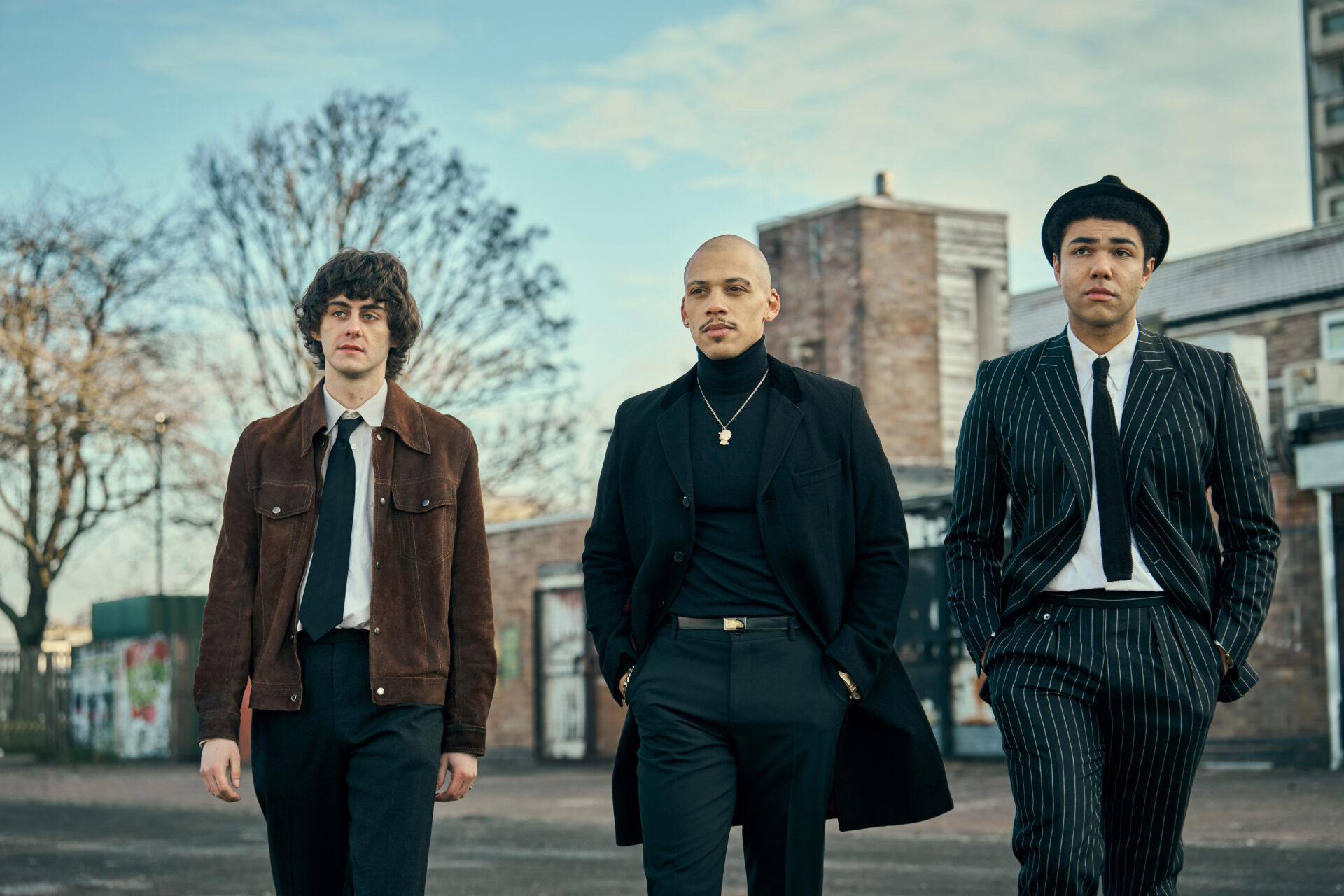
In 1981, Britain was at crisis point. The nation had entered the second year of a recession which saw over 2.5 million people standing in line for the dole, and the threat of miners’ walkouts and the IRA hunger strikes put maximum pressure on the newly instated Thatcher administration. Tensions were running high, with Black and Asian communities enduring an increase in racist attacks and police harassment as the force exercised hefty misuse of stop-and-search powers. As a result, following April’s Brixton Uprising, that summer saw riots rage across the Midlands, Liverpool, Leeds and Manchester.
This is the bleak landscape in which Peaky Blinders creator Steven Knight has set This Town, his latest love letter to the Midlands. While Peaky Blinders touched on similar themes of community, working-class lives and social turbulence, This Town centres on the youth experience in an era much closer to Knight’s heart. It features a group of characters he feels he could have grown up with, who demonstrate tenacity in the face of violence and uncertainty.
Set primarily between Coventry and Birmingham, This Town draws us into the world of an extended family and their wider network who are brought back together by the death of a key figure. It focuses on the paths of four young people as they collectively turn to music as a “lifeboat” and form a band. Getting famous is the only option in the face of familial tension, their only means of escaping the desolate destinies of people who come from a very particular kind of place.
One of the four main characters and band members is Dante Williams, an 18-year-old college student and aspiring poet for whom the adjective ‘weird’ is thrown around frequently. Played by newcomer Levi Brown, he is seemingly out of step with the rest of the world at a time when visual identity and alignment is vital, but he speaks with conviction and integrity and comes to music as a means of carrying his words.
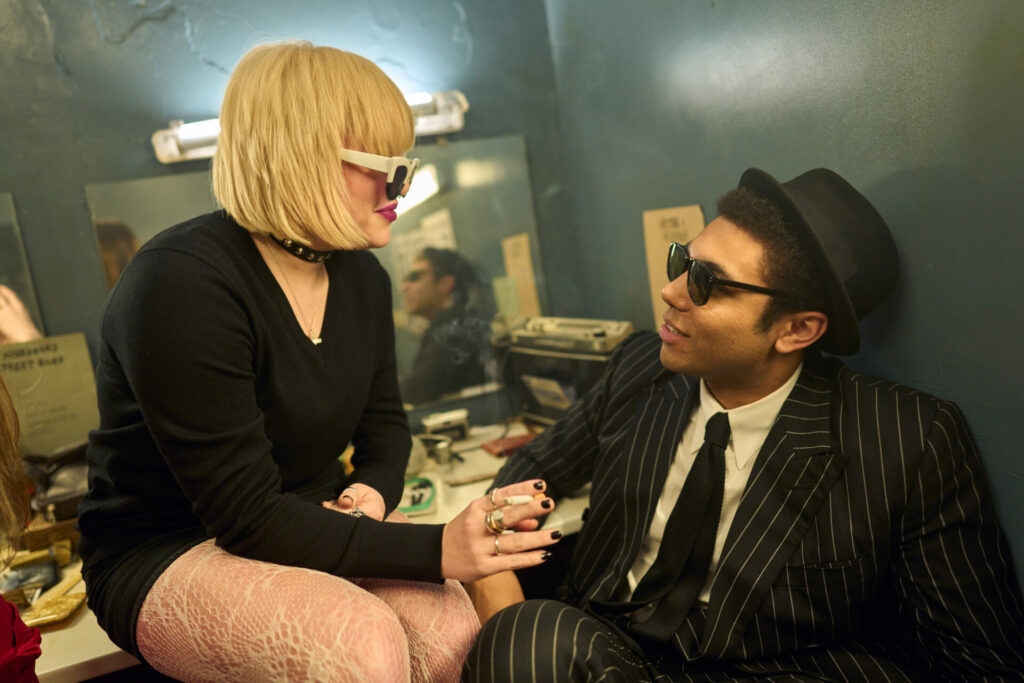
Brown is joined by Peaky Blinders alumnus Jordan Bolger as his on-screen elder brother Gregory Williams, a member of the Birmingham Zulus (a gang associated with football hooliganism) turned soldier. When we first meet him in This Town, he’s returned to Chelmsley Wood Estate on compassionate leave for the funeral. Having been stationed in Belfast during the height of the Troubles, a time characterised by the IRA hunger strikes, he is plagued with trauma and survivors’ guilt.
We’re reminded further of the political and social unrest that characterised the period just after Gregory has come home. For his own protection, Dante is not allowed out, for fear of the trouble he might get into. “Dad keeps me in,” Dante tells Gregory.
Ahead of the service, there’s a pivotal moment between Dante and their father (played by Nicholas Pinnock) in which he assures Dante he’ll be “opening up the box… but just a lickle”. His dad then proceeds to unveil one of his old suits, a relic from his days as a “bad boy” in Kingston, Jamaica. A sharp black pinstripe, double-breasted, white sock, black shoe, black tie, trilby hat ensemble, it is the epitome of the logo of Two Tone, one of the familiar music genres of the early 80s. As Dante dresses in the suit for the funeral, he comments that it doesn’t even look like him. He looks like a Rudeboy yet knows nothing of what that means — of its association with the working-class teens of the 60s, noted for listening to ska and for their reckless delinquency.
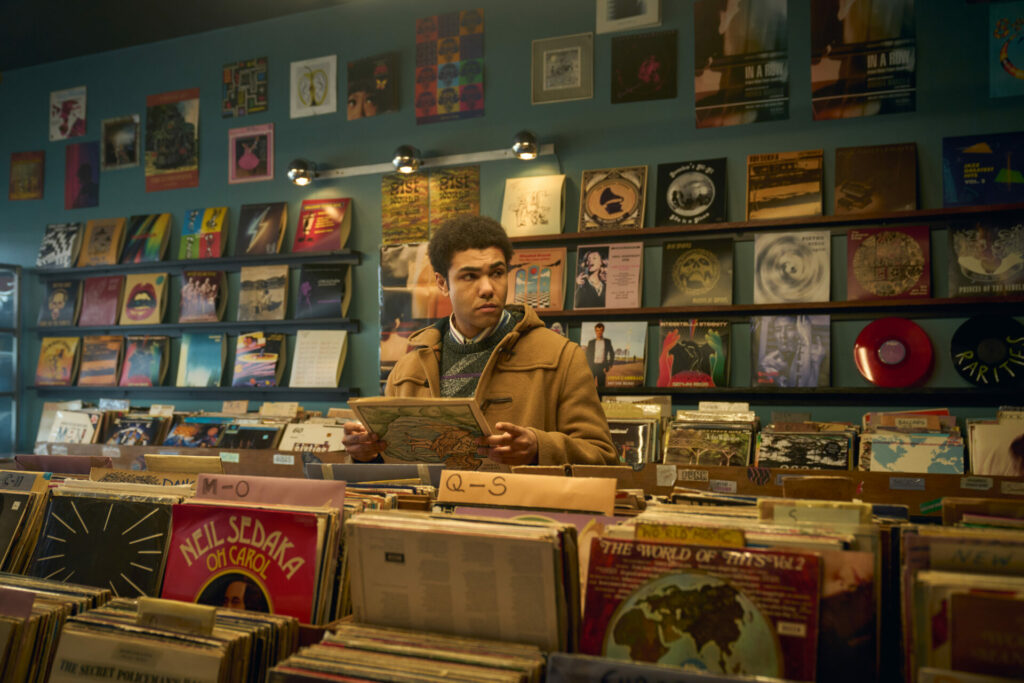
The suit introduces Dante to the divisive territory that comes with aligning yourself with a ‘tribe’ at a time when there were prominent and easily identifiable factions of youth, each of whom had an individual purpose, but all of whom were frustrated, and all of whom believed they were right.
“He [Dante] says when he puts on the hat he feels like dancing. And I think dancing for him doesn’t just mean dancing to a song, it means living life and getting into trouble,” says Brown.
This moment is a purposeful one. Dante is not representative of any group, neither does he champion any particular cause — except by accident, “and that’s the point,” Knight stresses, “just by accident”, he conforms to a look which was current. Dante is a very one-off person. He doesn’t seek the suit as a means of fitting in with the movement at large; instead “it happens to him”. Knight continues, “I think that I wanted him to represent the creative people who usually create these movements. If you think of Bob Dylan as an example, where he wasn’t going around talking about the peace movement, about Vietnam or anything, he just was that person somehow. And as a consequence of that, everybody gravitated around him.”
But at this point in the show, Dante is exposed to the consequences of his aesthetic when he breaks his composure over a hat and ends up in a bar brawl.
“He’s a troubled young man, and he’s living in a very chaotic world,” explains Brown, putting this lapse in cool down to the perceived naivety of the character, “Working-class kids just had to grow up so quickly.”
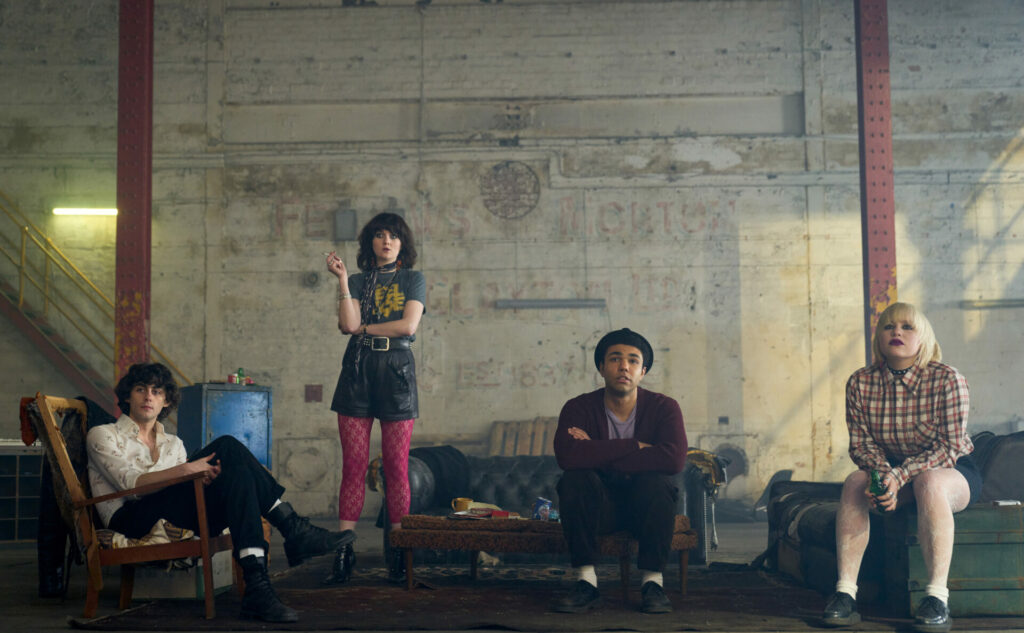
Dante is frogmarched from the pub by Gregory, at which point a poignant conversation — perhaps more akin to a desperate warning —begins between the siblings and their cousin, Bardon (played by Ben Rose), the son of an active IRA Provo who launders red diesel to fund shipments of arms and bomb-making ingredients in Coventry. It focuses on the premeditation of their lives based on where they’re from, how they look, and their background. It’s a theme that still feels current today.
“I think people are still facing that, 100 per cent,” says Bolger of that particular scene. For him, who was born in Coventry, the script felt close to home, like it was written for him. He remembers Coventry as a “vibrant” place despite its lack of opportunities, a city where “you need to make choices and you need to make the right choices,” which ultimately prepared him for the rest of his life. He still experiences negative reactions to his Coventry upbringing to this day.
In This Town, the brothers’ means of a ‘way out’ are representative of the seemingly only — extreme — options available to low-income youth, something which again doesn’t seem to have changed all that much. “I think that’s still kind of the struggles that the working-class community are faced with every day, every year. Each generation,” says Bolger. “You can make money, but if you don’t have financial literacy and guidance, then the money isn’t going to get put into the things that can support you and be sustainable. So, yeah, you hope that you get into sport, you hope you get into some kind of avenue that can take you away. And the military, I think, has been one that has probably been there for a long time, for people who don’t have that many options.”
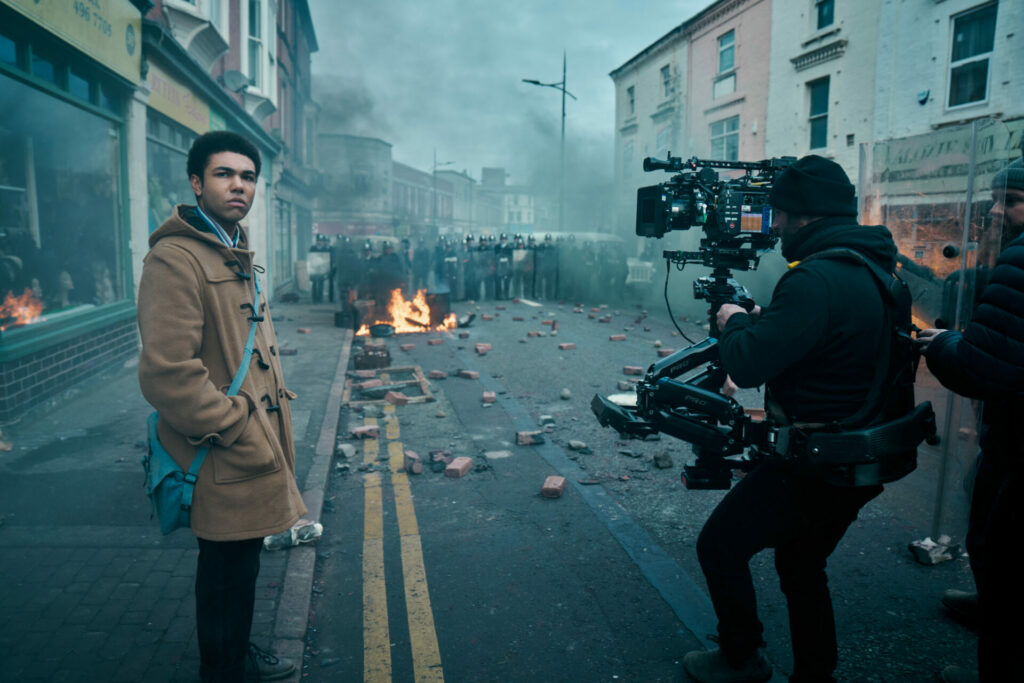
Bolger then makes a comparison to those who grow up in affluent families. “If you grow up with a silver spoon, you grow up with people guiding you. You don’t have to have so much vision and scope and [to] look out for the dangers and the opportunities. But when you grow up with not being given so much, you have to do a lot with the little you have. You have to make your decisions smart.”
This concept of “destiny” based on your background is a major theme throughout the series and highlights Knight’s unrivalled ability to tell stories which exist in the grey areas of life and which relay the complexities of living in a tumultuous landscape, where people argue about who is right and who is wrong, both politically and within the realm of family allegiance, and the lengths they’ll go to in order to protect what is theirs. Knight validates the search for community, identity and belonging, and the things people do and the places they go in search of that, with real heart and humility — even if these things sit outside the norm of what is seen as ‘right’. To quote a poignant line from the show, the things that are “illegal, not inhuman”. This ties in with the working-class experience Knight often explores within his work, having come up through the estates of Birmingham himself.
“There are certain things that are illegal that people do that everybody’s fine with, you know, because they’re essential — you have to do those illegal things,” he says. “And so, the law doesn’t match the morality of yourself and everybody around you. You know, you’ve got a different law.”
Bolger expands on the theme. “When you look at the working-class experience, there are some things that are so normal to a working-class community because it’s ‘you have to.’” He praises Knight’s inclusion of these themes in the series, and his writing in general, and how he makes a point of humanising them, “because I think it would be quite easy to go, ‘It’s wrong. People shouldn’t do it.’ But when you have the ‘whys’ and the ‘hows’, it makes it way more understandable.” The series addresses how difficult it is to progress if you are born into these kinds of circumstances, and how the need for community is key to getting there. While the middle class, or upper middle classes, have their own sets of rules and are united and “know what they’re doing”, the series reflects the importance of knowing your own structure as a way of being strong in the face of adversity.
“It’s what Peaky’s about, and it’s what this is about as well,” Knight explains, “it’s not trying to accept a system of judgement where ‘isn’t it a shame’ or ‘isn’t it awful’ applies to particular ways of being that just happened to be different.”
But the working-class experience portrayed in This Town isn’t purely bleak. In the early production meetings, Knight was keen for the council estates to look beautiful, like somewhere that “everybody wants to live,” in order to represent the subjective point of view of the people who were involved and to share an accurate history of the people who were living there at the time. “It’s where I grew up and it’s not awful,” he says, “it’s actually great. It’s a laugh.” Beyond the grit, the violence and the struggle, is vibrancy, creativity and resourcefulness. These themes are key to the progress of the lead characters, whether it’s Jeanie, a skinhead and band member, who records tapes at parties because she can’t afford to buy them, or Bardon offering up a “guitar, a tin whistle and a big fucking Irish drum”, in order for the cousins to write something that somewhat resembles a song.
Among all this is the theme of love in all its various shades, which functions as both a means and a cause for the characters. “This thing is about people falling in love with each other,” says Knight. “But also, when it gets gritty and nervous and difficult, love is still in there somewhere and it’s still doing its job.”
For Bolger, it’s central. “They’ve got the personal people that they’re living for, they’re doing things for. And doing the things they don’t want to do as well, whether it’s fighting addictions or fighting people. They’re doing it for someone,” he says.
But in the case of Dante, love turns the focus away from life’s desolate reality. Knight talks about history as not standing back from the painting but being in the painting, and the tunnel vision Dante develops when writing a song for a girl he likes is a truly honest rendition of what life would have been like for young people at that time. The naivety of the teenager is equal to a kind of resilience. Brown says, “There was a lot of noise, and I think the naivety is… Dante is aware of all that, but I think he just chooses to ignore it. To do your own thing as a teenager or as a young person is terrifying.”
Fast-forward to 2024, then, and the politics of today feel hauntingly similar to the state of this country in 1981 and the preceding years. In a post-everything Britain — Brexit, the pandemic, Trump, Black Lives Matter — the population sits on a sliding scale of apathy and rage, demoralised by 14 years of Tory rule, and the rise once more of far-right ideologies. Demonstrations blaze across the country as a result of Israel’s ongoing assault on Palestine, the cost of living crisis is crippling families, and anti-immigration rhetoric is fanning the flames of division, all of which marks the beginning of an incredibly tense election year.
Rather than hitting our screens as a mere object of retro fascination, This Town simultaneously offers poignant reminders and a glimmer of hope in the form of music and the band at the centre of the action. While Knight doesn’t ever write with an agenda, he describes today’s world as “difficult and a little bit bleak”. He talks about hope and its usual source coming from young people, but how he doesn’t feel that right now. “You feel that division and people separating themselves and deciding that they’re this or they’re that, and the problem is that the idea of coming together is now corny or sentimental. But the point is, a show like this is suggesting that the thing that can possibly be a trigger for getting rid of that is music.”
It is through music that we are shown that despite the racial tensions of that time — and this — harmony is possible. Its central characters, Dante and Gregory, are both Black, their dad is from Jamaica, and their mum is from Coventry, while their cousin is Irish — but all that, as Knight points out, is irrelevant. “It was nothing to do with race. It was to do with music.”
He illustrates the point with his own personal experience. In 1981, Knight was in his early twenties. While it was a time of social upheaval, for him that period was about Birmingham City football matches (“which we’d probably lost”), followed by a trip to the pub, where, inevitably, a lot of young people would be causing trouble, but there would be this music which seemed “to fit as if it was designed for that moment”.
He recalls how music acted as a unifier: “It was just people who were from Birmingham and Coventry, from the same estates, the same places, who liked the same music. So, they naturally got together and listened to the same music. When ska first came, it was the music that skinheads were listening to, and it was the music that young Black people were listening to, and there was that thing — that music united them.” He recalls vividly that these conversations didn’t happen deliberately, but that it was just people not doing something stupid, “which was to identify each other according to race. It was the abstinence of that stupidity. And that’s what I think was so remarkable about it.”
The soundtrack of the series encompasses a fairly broad mix of genres and styles, touching on ska, reggae, Two Tone, new wave and punk, including prominent artists and bands of that era. (Despite the title of the drama and its similarity to the opening lyric of The Specials’ 1981 hit ‘Ghost Town’, it does not feature.) The tracks chosen perfectly capture the zeitgeist of the time and provide the landscape in which we find our cast. They mark the peak of a youth movement and its commentary which inspired hope in the form of community and of music as an ‘out’ — themes which lie at the very heart of This Town. While Knight makes it clear that music is pivotal to This Town’s narrative, the show isn’t a “forensic examination” of music history; rather, it has everything to do with the possibilities that music inspired.
My conversations with Bolger and Brown inevitably turn to the legacy of the music of this period, Two Tone in particular, and the show’s resonance with the modern viewer. “I think it’s going to be quite nice for people at this point in time where there are so many pressures in so many different ways to look back at a sort of slightly simpler time that wasn’t so long ago where something so simple as music and a love of music brought people together who were very divided before that point, and to just sort of look at it and go, ‘It is possible and it is possible in this era. We’re not so far from this right now.’ So, it gives some hope,” says Bolger.
Brown ruminates on this notion too, with both actors recalling their experiences more recently of music operating as a unifying force. Whether that’s at Northern Soul nights for Bolger, or a Kendrick Lamar gig for Brown, in both instances a collective act of dancing and singing has brought a commonality between a breadth of different people, from different places, at different points in their lives.
“Maybe there will be something that comes out that just kind of makes everyone go, ‘Oh my God. Like, you can’t not like this. This is something that is speaking for us.’ And I do think we’re in a time now where maybe one song could do that or maybe a new genre will be born out of it. But I don’t know… you never know with music. You never know,” Brown muses. “And that’s why it’s so bloody great.”
All episodes of This Town will be available from 6am Sunday 31 March on BBC iPlayer, the series begins on BBC One at 9pm that evening
